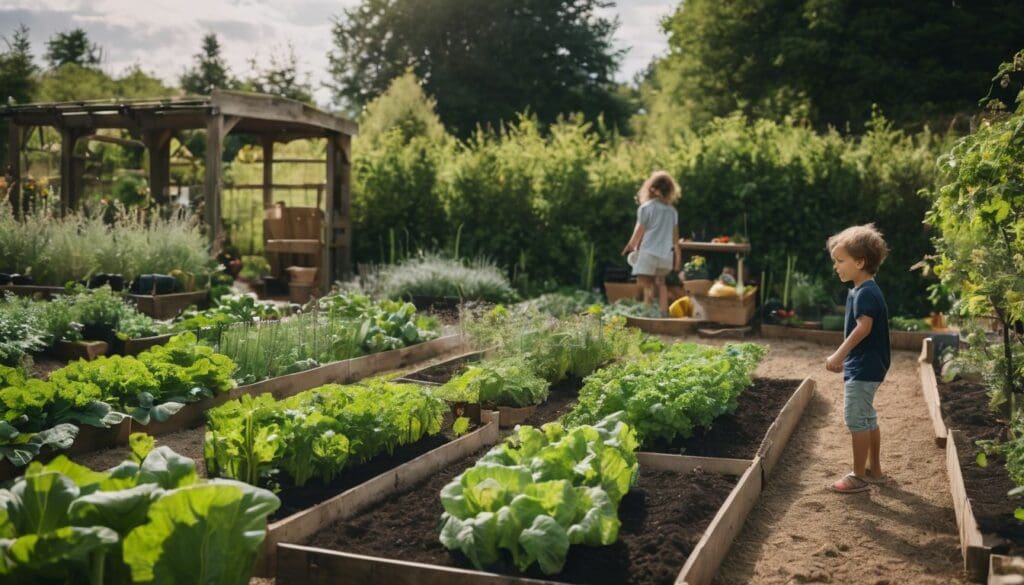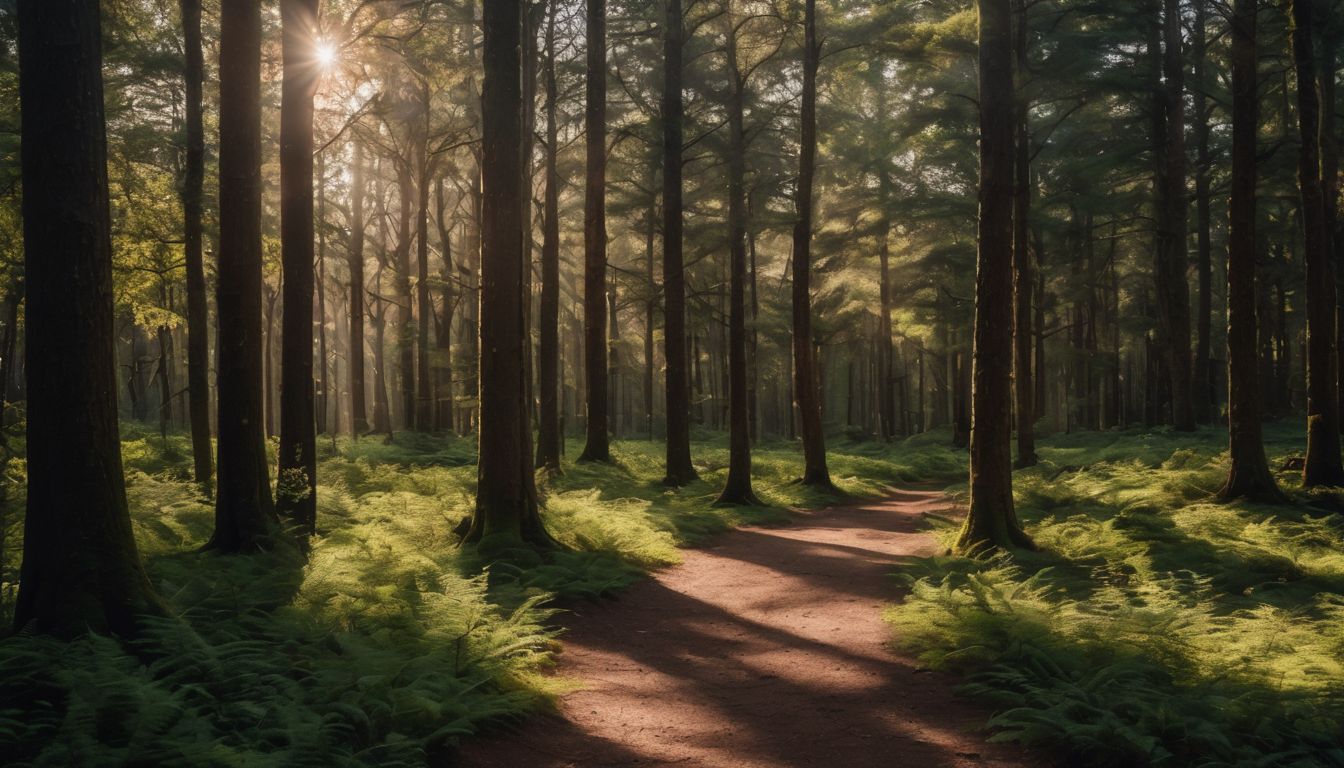Engaging our youngest generation in the stewardship of our planet isn’t just a noble pursuit; it’s a critical one. With each passing year, the need to adopt sustainable practices becomes more urgent, as environmental concerns like climate change and resource depletion command global attention.
I carry years of experience working in environmental education, sharing my knowledge with families eager to instil eco-conscious values and practical green habits in their children.
This blog post is your treasure map to a world where sustainability meets fun for the whole family. From turning waste into wonder through upcycling projects to nurturing young gardeners with their very own veggie patches, these activities are not only enjoyable but also empower kids with valuable life skills.
And there’s an added bonus: research shows that engaging children in these experiences can significantly influence the entire household’s approach to living sustainably. Let’s embark on this journey together and sow the seeds for a greener future!
Key Takeaways
- Organising eco – scavenger hunts teaches children about sustainability and conservation, while nurturing an appreciation for the environment through fun exploration.
- DIY composting is an effective hands-on activity that shows kids how organic waste can enrich soil and reduce landfill emissions, imparting crucial lessons in waste management.
- Planting a kitchen garden not only educates young minds on where food comes from but also helps them understand the impact of sustainable farming practices on reducing food miles.
- Upcycling crafts enable children to exercise creativity in reusing materials, fostering a culture of resourcefulness and highlighting the importance of reducing waste.
- Participating in community events like local clean-ups or workshops enhances their understanding of eco-friendly practices within their immediate environments and encourages active stewardship.
Importance of Teaching Kids about Sustainability
Teaching children about sustainability instils in them the value of environmental stewardship from a young age. Children become future custodians of our planet, and early education on eco-friendly practices can shape their long-term habits and attitudes towards the environment.
They learn to respect nature, understand their impact on the ecosystem, and cultivate green activities as part of daily living. A child who grows up knowing how to recycle properly, conserve energy and reduce waste carries these skills into adulthood.
As children engage with sustainability, they often bring fresh enthusiasm into family habits. This reverse socialisation influences households to adopt more sustainable lifestyles.
For example, when children learn through fun activities like planting a kitchen garden or making eco-conscious crafts, they’re experiencing hands-on lessons about where food comes from and why we should repurpose materials instead of throwing them away.
These practical experiences foster an understanding that small actions collectively make a significant impact on conserving resources for future generations.
Engaging Kids in Sustainability through Fun Activities
Get kids involved in sustainability through fun activities like eco-scavenger hunts, DIY composting, planting a kitchen garden, upcycling crafts, nature photography, and energy-saving challenges.
These activities are not only enjoyable for children but also help instil a sense of environmental awareness and responsibility.
Eco-scavenger hunt
Eco-conscious families can engage kids in sustainability by organising an eco-scavenger hunt.
- Create a checklist of items related to nature exploration and conservation efforts, such as recyclable materials, specific plants or trees, or wildlife habitats.
- Encourage children to actively seek out these items in their surroundings, promoting environmental awareness and planet care while having fun.
- Discuss the importance of each item found, emphasising its role in contributing to sustainable living and the preservation of natural resources.
- Incorporate educational facts and tidbits about the environment during the scavenger hunt to enhance children’s understanding of conservation efforts.
- Conclude the activity by discussing how their participation directly supports sustainable learning activities for children and encourages ongoing eco-friendly practices within the family.
DIY composting
Teaching kids about sustainability through hands-on activities is crucial for nurturing eco-conscious behaviour. DIY composting is a fantastic way to engage children in environmental responsibility and reduce waste. Composting helps to enrich the soil, reduces methane emissions from landfills, and minimises the need for chemical fertilisers. Engage kids in this activity by explaining how organic waste can be turned into nutrient-rich soil for plants. Set up a compost bin or pile in your backyard and involve children in collecting food scraps and yard waste for composting. Teach them about the different types of organic materials that can be composted, such as fruit peels, vegetable scraps, coffee grounds, eggshells, and yard clippings. Encourage them to monitor the decomposition process and explain how it benefits the environment. Lastly, use the finished compost to nourish a garden or potted plants, demonstrating the full cycle of sustainability to kids.
Planting a kitchen garden
Planting a kitchen garden is a hands-on way to teach kids about sustainable living and where food comes from. It also encourages healthy eating habits and provides an opportunity for children to take care of living things.
- Choose a selection of vegetables, herbs, and fruit that are easy to grow in your region, such as tomatoes, lettuce, carrots, strawberries, and basil.
- Involve children in preparing the soil, planting the seeds or seedlings, and watering the garden regularly.
- Teach kids about the importance of composting and using natural fertilisers to nourish their plants while minimising waste.
- Discuss the benefits of growing their own produce, including reducing food miles and avoiding harmful pesticides.
- Encourage kids to observe and record the growth stages of their plants, fostering a deeper understanding of nature’s cycles.
Upcycling crafts
Get creative with upcycling crafts to teach kids about sustainability and the value of repurposing items. Here are some engaging ideas for eco-friendly projects that will encourage environmental responsibility:
- Transform old t-shirts into reusable tote bags by cutting and sewing, reducing the need for single-use plastics and promoting sustainable shopping habits.
- Repurpose glass jars and bottles into decorative vases or storage containers, teaching kids about the importance of reusing materials and reducing waste.
- Create imaginative artwork using discarded cardboard, paper scraps, and other recyclable materials, fostering a sense of creativity while promoting eco-conscious practices.
- Turn worn – out denim jeans into stylish denim pouches or coin purses, demonstrating the potential for giving new life to old textiles through innovative upcycling methods.
- Craft unique bird feeders from recycled materials such as plastic bottles or milk cartons, emphasising the concept of providing for wildlife while minimising environmental impact.
- Design personalised bookmarks from cardboard packaging or scrap paper, encouraging children to appreciate the value of repurposing everyday items in a sustainable manner.
Nature photography
Encourage your kids to explore the great outdoors and appreciate nature through the lens of a camera. Nature photography is an engaging way for children to connect with the environment, observe wildlife, and capture stunning natural landscapes.
By snapping away at plants, animals, and scenic views, they can develop a deeper appreciation for the world around them while learning about composition, lighting, and perspective.
This hands-on activity not only promotes environmental awareness but also fosters creativity and mindfulness in young minds.
As your kids immerse themselves in nature photography, they’ll learn to pay attention to detail and discover the beauty in their surroundings. This activity provides an opportunity for them to get up close with various elements of nature while cultivating a sense of respect for the environment.
Energy-saving challenges
- Turn off lights when leaving a room to save electricity and reduce carbon footprint.
- Unplug electronic devices when not in use to minimise energy consumption.
- Use natural lighting during the day instead of turning on artificial lights.
- Set a challenge to limit shower time for each family member, conserving water and reducing energy used for heating.
- Make a game out of finding and fixing air leaks in the house, which can help reduce energy waste.
How to Incorporate Sustainability in Daily Life
Choose eco-friendly products, reduce waste by reusing and recycling, and support small and local businesses to make sustainable living a part of your everyday routine. Interested in more ways to engage kids in sustainability? Keep reading for additional resources and fun activities for eco-conscious families.
Reduce, Reuse, Recycle
Teaching kids about sustainability is vital for their future. It’s essential to instil eco-friendly habits early on, and the mantra of “reduce, reuse, recycle” is a great way to start. Here are some simple ways families can incorporate this philosophy into their daily lives:
- Encourage kids to use reusable water bottles and lunch containers to minimise waste while at school or on outings.
- Sort household waste together, showing children how items like paper, plastics, and glass can be recycled instead of being thrown away.
- Get creative with reusing items – turn old jars into storage containers or transform cardboard boxes into fun DIY projects.
- Shop with a focus on reducing packaging waste by choosing products with minimal or recyclable packaging.
- Organise clothing swaps with friends or donate clothes and toys to charity shops instead of throwing them away.
- Repurpose old items in arts and crafts projects to give them a new lease of life rather than adding more waste to landfills.
- Discuss the importance of reducing consumption as a family and focus on quality over quantity when making purchasing decisions.
- Involve children in composting food scraps and garden waste, showing them how organic materials can be reused to enrich soil instead of being discarded.
- Teach kids about the impact of electronic waste and how they can recycle old electronics responsibly through designated programmes or facilities.
- Engage in community clean – up events together as a family, reinforcing the values of reducing waste and caring for the environment in tangible ways.
Shopping small and local
When families choose to shop small and local, they support their community and reduce the environmental impact of transportation. By purchasing from nearby businesses, families can lower carbon emissions associated with long-distance shipping.
Furthermore, buying locally produced goods often means fewer resources are used in the production process, contributing to a more sustainable lifestyle for both consumers and producers.
Supporting small and local businesses also fosters a sense of community and connection between families and their neighbourhoods. It allows children to witness firsthand the positive effects of supporting local economies while learning about the value of sustainability in everyday life.
Choosing eco-friendly products
When making purchasing decisions, opt for eco-friendly products to reduce your family’s environmental impact. Look for items with minimal packaging, biodegradable materials, and a focus on sustainability.
Selecting reusable options such as cloth grocery bags and stainless steel water bottles can significantly decrease waste. Additionally, seek out products that are certified organic, fair trade, or made from recycled materials to support environmentally responsible businesses and practices.
By choosing eco-friendly products, families can actively contribute to conserving natural resources and protecting the environment. Encouraging the use of energy-efficient appliances and non-toxic cleaning supplies will further promote sustainable living habits.
Additional Resources for Teaching Kids about Sustainability
Looking for more ways to teach your kids about sustainability? Check out some great books about the environment, educational videos and games, as well as community events that can help engage your children in eco-conscious activities.
Books about the environment
Teach your kids about sustainability with engaging books that highlight environmental issues and inspire eco-conscious living. Reading storybooks about the environment can be an enjoyable and impactful experience for the whole family, encouraging a sense of environmental stewardship and responsibility. Here are some recommended books to get you started:
- “The Lorax” by Dr. Seuss: A classic tale that conveys the importance of environmental conservation, teaching kids about the consequences of deforestation.
- “The Great Kapok Tree” by Lynne Cherry: This beautifully illustrated book educates children about the interconnectedness of life in the rainforest and the impact of deforestation on wildlife.
- “Michael Recycle” by Ellie Bethel: This fun story follows a young superhero who teaches his town to recycle, promoting eco-friendly habits and waste reduction.
- “Our Big Home: An Earth Poem” by Linda Glaser: Through poetic language and stunning illustrations, this book celebrates Earth’s beauty while emphasising the importance of preserving our planet.
Educational videos and games
Engaging kids in sustainability can be further enhanced through educational videos and games that offer valuable insights into environmental conservation. These resources offer interactive ways to learn about eco-conscious behavior and sustainable living. Here are some engaging options for teaching kids about sustainability:
- Interactive Videos: Children can watch educational videos that cover topics such as recycling, energy conservation, and protecting wildlife habitats. Platforms like National Geographic Kids and DisneyPlus offer a wide range of entertaining yet informative content.
- Environmental-themed Games: There are various online games designed to educate children about sustainability while keeping them engaged. These games often focus on concepts like environmental protection, renewable energy, and waste reduction, providing an enjoyable learning experience.
- Virtual Field Trips: Online platforms provide virtual tours of natural habitats, eco-friendly cities, and sustainable farms. These interactive experiences allow children to explore different aspects of environmental conservation from the comfort of their homes.
- Eco-Friendly Apps: There are numerous apps available that encourage kids to develop eco-friendly habits such as saving energy, reducing waste, and making environmentally conscious choices in their daily lives.
- DIY Science Experiments: Educational science-based activities teach kids the principles of sustainability through hands-on projects like creating homemade solar ovens or conducting water conservation experiments.
Community events
To further enhance children’s understanding of sustainability, attending community events can be a great way to immerse kids in environmental education. Encouraging participation in local clean-up initiatives or nature walks organised by conservation groups helps kids appreciate the importance of biodiversity and caring for natural habitats.
Additionally, engaging in eco-fairs or farmers’ markets provides an opportunity for families to learn about sustainable practices and support local businesses offering eco-friendly products.
Attending workshops or talks on environmental topics tailored for families can also foster awareness and action towards sustainability. Such events offer valuable insights into reducing waste, conserving energy, and supporting green initiatives within the community.
Conclusion
Engaging kids in sustainability through fun activities fosters a strong sense of environmental responsibility. Encouraging eco-conscious behavior at a young age can create lasting habits that benefit the planet.
Implementing these activities allows families to bond while making a positive impact on the environment. Making sustainability enjoyable for children helps instill a lifelong commitment to caring for the Earth.
Introducing green living practices early equips kids with the knowledge and tools to contribute towards a healthier, more sustainable planet.
FAQs
1. What are some eco-friendly activities for families to do together?
Families can plant a garden, engage in recycling projects, organise clean-ups in nature parks, or craft with recycled materials as fun eco-conscious family activities.
2. How can we teach kids about sustainable living through play?
By including children in environmental education games and outdoor activities that highlight green living principles, families can make learning about sustainability an exciting adventure.
3. Are there any earth-friendly projects that kids can lead at home?
Absolutely! Kids can start their own compost bin, create art from upcycled materials or set up a rainwater collection system as part of engaging eco-friendly projects for the whole family.
4. Can you suggest some green living activities suitable for young children?
Sure! Young ones might enjoy story time focused on the environment, planting seeds to watch them grow into plants or going on nature walks to learn about wildlife and ecosystems.
5. Why is it important for an eco-conscious family to involve kids in environmental actions?
When families involve their children in eco-conscious activities and decisions early on, they foster respect for our planet and encourage lifelong habits of caring for the environment.





